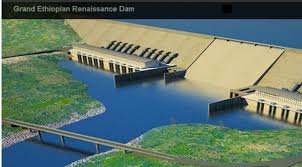Some Egyptian media outlets have recently reported that the Nile water is a matter of national security and hence a matter of life or death for Egypt. But more than ever, it has also become a matter of life or death for Ethiopians too.
First and for most, Ethiopia contributes more than 80 percent of the Nile. And sadly, there are millions of poor people in Ethiopia who do not have access to clean drinking water, electricity, education and primary health services.
It is a historic point in time in Ethiopia that the country aspires to transform the structure of its economy and join lower middle income countries through the successive five year growth and transformation plans. With these, the Ethiopian government aspires to lift millions of its citizens out of poverty.
As it has been depicted so many times, the Nile water and the construction of Grand Ethiopian Renaissance Dam (GERD) is part and parcel of Ethiopia's ambitious plan to get rid of poverty, improve access to health and education, reduce maternal and child mortality, improve the livelihood of the rural population, create jobs for its rapidly growing youths and above all transform the structural basis of its economy.
This is because; while the country is on the right track to achieve these lofty development goals, yet sustainable supply of energy remained a critical issue. That is why GERD is also a matter of life or death for Ethiopia.
At the beginning, the first question was on whether Ethiopia is able to accomplish the construction of the Dam or not. Nobody believed the country is going to finalize such a mega project by mobilizing its own internal resources, as almost all international financial sources were hijacked.
The realization of GERD has almost become certain as the construction would be finalized in the foreseeable future. And now the rhetoric has changed entirely and the argument is no more about the dam would be constructed or not. "The dam is 63% completed and it is being constructed around-the-clock," Ethiopian Water, Irrigation, and Electricity Minister Sileshi Bekele has said recently.
On the other hand, recently, Egypt's Minister of Water Resources and Irrigation, Mohamed Abdel Ati acknowledged that Egypt could not prevent the construction of the dam, but it also could not afford any substantial deficiency in its historical share of water.
"We have many alternatives in between the two impossible alternatives; to dispense with the Nile water and not to build the dams altogether," he said. "There are other ways to negotiate, and Egypt has started many of these ways, but they cannot be declared."
Of course, the first issue of contention/controversy over the Nile water is regarding the colonial agreements and historical rights over the water. Ethiopia, presenting a well organized argument has already invalidated both claims in any legal or moral standards. The construction of GERD by itself is a testimony to this fact.
Now the issue of contention is the filling of the dam. As the time to start filling the dam is approaching, the main and practical option here is to start filling the dam based on the findings of the first tripartite study and in a way that could not harm Egypt's share of water.
This, together with good will from the side of Egypt, seems to the best way forward. Hence, everybody has to come to the table to continue negotiations. Since the commencement of the construction of the dam, Ethiopia's intention has always been within the framework of building confidence and a spirit of cooperation. Ethiopia is always open to negotiations on the technical issues of the dam.
In this regard, Sudan's positive move also flickers a ray of hope. Sudan properly analyzed the issue and go for the win-win solution, leaving behind the old way of thinking.
Some Egyptian media outlets that have been fanning the flames with exaggerations should learn from Sudan's positive attitude and restrain from their futile activities. Instead, they should promote rational dialogue so that everybody comes out victorious in negotiations.
It is important to understand the Ethiopian side of the story. Most Ethiopians have paid a lot sacrifice to realize this flagship project. GERD has become a national identity for Ethiopians. It will be a very big national accomplishment and definitely, it will also have significant return to investment.
Copyright © 2017 The Ethiopian Herald
Hi! I am a robot. I just upvoted you! I found similar content that readers might be interested in:
http://www.ethpress.gov.et/herald/index.php/editorial-view-point/item/10323-gerd-is-also-a-matter-of-justice-fairness-and-mutual-respect